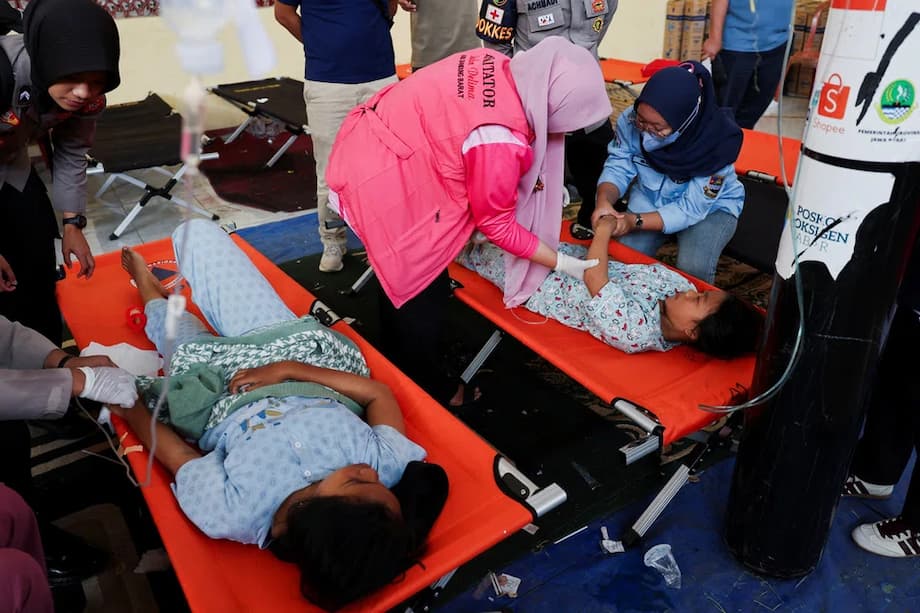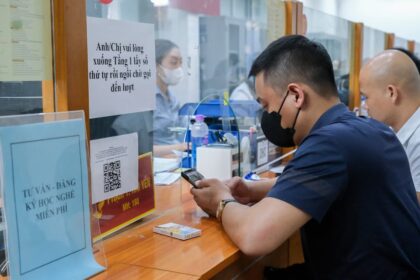Crisis tests Indonesia free meals program
Indonesia has shut kitchens tied to its free meals program after a series of mass food poisoning cases, but the nationwide rollout will continue under tighter supervision. The National Nutrition Agency, which runs President Prabowo Subianto’s Free Nutritious Meals program (Makan Bergizi Gratis, MBG), said kitchens implicated in incidents have been suspended while investigators trace sources of contamination. The move comes around nine months into the program, which aims to improve child nutrition and reduce stunting by serving daily meals to schoolchildren, toddlers, and pregnant and breastfeeding women.
Officials say more than a billion portions have been served this year. Yet suspected poisoning cases have climbed. The agency has acknowledged at least 4,711 cases recorded through late September. Indonesia’s Health Ministry and the food and drug regulator have counted more than 5,000. Watchdog groups tracking schools report higher totals, including 6,452 cases compiled by the Indonesian Education Watch Network (JPPI). A coalition of health and education organizations says the national tally could already exceed ten thousand. Several of these groups are urging a temporary halt to the program until food safety controls are rebuilt.
The latest wave hit West Java and Central Java in September. In Sragen, Central Java, local authorities said 365 people fell ill after one day’s lunch was distributed from a central kitchen to several schools. In West Bandung Regency, West Java, officials reported more than a thousand students with stomach pain, dizziness, nausea and shortness of breath across multiple days. Earlier this year, labs in West Java detected Salmonella and E. coli in school meals after another large episode. On other days, students and teachers in several provinces complained of poor quality or spoiled items, including expired sauces, insect contamination and, in one case, shards of glass in rice.
What happened in schools and kitchens
In many districts the meals are prepared in Nutrition Fulfillment Service Unit kitchens (SPPG), then packaged and transported to schools on tight schedules. The model can work when refrigeration, clean water, and trained staff keep bacteria in check. When any one piece fails, risk spikes quickly. The large Sragen case involved turmeric rice, egg strips, fried tempeh, a cucumber salad, fruit and milk cooked in a central kitchen and sent to several schools. Authorities ordered that kitchen to pause operations pending lab tests.
Sragen regency chief Sigit Pamungkas said investigators were waiting for lab results and reviewing hygiene at the kitchen involved.
We cannot draw specific conclusions right away. The program needs to be more stringent and more hygienic.
Recent incidents by region
- West Java, West Bandung Regency: more than 1,000 students fell ill across several days. Local leaders declared an extraordinary event to speed treatment and investigation.
- Central Java, Sragen: 365 people sick after a central kitchen distributed meals to multiple schools. Operations suspended pending lab results.
- West Java, Cianjur (April): at least 165 students fell ill; preliminary tests of containers showed contamination with Staphylococcus, E. coli and Salmonella. Full lab results took several days.
- West Sulawesi, Mamuju: dozens fell ill; local reports pointed to expired sauce in one incident. Two students were reported in critical condition in a separate case.
- West Kalimantan, Ketapang: at least 25 students and teachers were sick after MBG meals. The regional program head acknowledged fried shark was wrongly included on the menu, citing storage and mercury concerns.
- East Java, Tuban and South Sulawesi, Bulukumba: students reported finding maggots in meals on some days. In Batam, Riau Islands, glass fragments were reportedly found in rice.
- Southeast Sulawesi, Baubau; Central Sulawesi, Banggai; and other areas: additional clusters of illness were recorded during the year.
Local governments have covered medical costs for affected students and ordered kitchens tied to clusters to stop service pending inspections. In several regencies, task forces were activated to supervise menus, kitchen hygiene and delivery schedules.
Government steps and internal admissions
The National Nutrition Agency has publicly accepted that oversight fell short. Deputy head Nanik Deyang apologized for recent outbreaks and said some partners and internal teams had failed to follow standard operating procedures. The agency has started closing kitchens that lack health certification, banned processed foods from menus, and launched joint investigations with health regulators and police. Officials say dozens of kitchens have been shut for noncompliance, while hundreds more are being audited.
To stabilize operations, the government says all kitchens will be equipped with basic hygiene and testing tools, including food test kits, hot water washing and drying equipment, and clean water filtration. A presidential regulation is being drafted to define the roles of each government body, with the Health Ministry responsible for oversight and the National Nutrition Agency acting as the implementing body. The program has already been scaled to more than 20 million recipients, with plans to reach about 83 million by year end if safety improvements hold.
Nanik Deyang, a deputy head of the National Nutrition Agency, linked the cases to weak supervision and sloppy practices.
We apologize for the incidents. They arose from a lack of oversight and failures to follow standard operating procedures by some partners and internal teams. We are increasing supervision immediately.
BGN head Dadan Hindayana said the agency regrets the poisonings and will investigate each case. He defended continuing the rollout while closing problem kitchens and tightening controls.
Out of roughly one billion portions served this year there have been a few thousand suspected cases. We regret every one of them. We will investigate and improve while the program continues.
To raise skills quickly, the agency will deploy 5,000 professional chefs from the Indonesian Chef Association to train and mentor MBG cooks in SPPG kitchens across the country. The association plans to certify kitchens and personnel to common standards. As of early October, authorities reported more than 10,000 MBG kitchens operating nationwide.
Chef Susanto, who chairs the Indonesian Chef Association, said the group will focus on practical training in kitchens.
Our chefs will mentor kitchen teams directly and help put in place consistent standards and safe practices. We will work on certification so every kitchen meets professional food safety.
Cabinet Secretary Teddy Indra Wijaya said the government is accelerating equipment upgrades in kitchens and expects the presidential regulation to clarify responsibilities so there is no confusion between agencies during oversight and enforcement.
Why the poisonings spread
Food safety experts say the program’s scale and speed outpaced the systems needed to safeguard each portion. Sri Raharjo, a professor of food technology at Universitas Gadjah Mada, said weak oversight combined with ambitious targets created predictable risks. He noted that building and staffing tens of thousands of kitchens takes money, time and trained people, while rushing large volumes of meals can lead to temperature abuse, cross contamination and undercooked dishes.
Professor Raharjo cautioned that unless supervision is strengthened, more kitchens are properly staffed, and clear rules are in place, growth will continue to magnify failures.
Targets were overly ambitious. Building and staffing tens of thousands of kitchens takes time and systems. When oversight is weak, incidents rise with scale.
He has urged a stronger legal framework for school meals and said schools and parents should be able to decline participation if local kitchens are not ready, without fear of penalty. He also called for data collection on nutrition outcomes to judge whether the program is meeting its core goal of improving health.
How basic food safety breaks down
Common foodborne bacteria multiply quickly in the temperature range that is typical when cooked food is held and delivered without proper cooling or reheating. Cooked rice can harbor Bacillus cereus if it cools slowly. Staphylococcus can spread from hands when sanitation is weak. Salmonella and E. coli can contaminate poultry, eggs, meat and raw vegetables. When central kitchens prepare thousands of portions, keeping hot food above safe temperatures, cold food chilled, and raw and cooked items separate becomes critical. Long transport times, poor water quality, and inadequate cleaning of tools compound the danger.
Lab tests in earlier West Java cases found Salmonella and E. coli contamination. These organisms can cause diarrhoea, cramps and fever. Doctors in recent outbreaks also recorded shortness of breath among students, which can happen in mass events when dehydration and anxiety set in while children queue for treatment.
Pause or press on
Pressure to halt the program continues to mount from civil society groups. JPPI, the Center for Indonesia’s Strategic Development Initiatives, food rights groups and anti corruption watchdogs have all urged a temporary pause, arguing that a short break would allow a thorough audit of kitchens, supply chains and training. Several organizations filed a complaint with the National Commission on Human Rights, alleging that a failure to ensure safe meals violates basic rights and that some communities felt discouraged from reporting incidents.
Ubaid Matraji, JPPI national coordinator, said closing kitchens only after outbreaks does not prevent the next cluster.
Closing kitchens only after children get sick is ineffective. Suspend the program long enough to fix food safety, then restart with stronger oversight.
Komnas HAM commissioner Atnike Nova Sigiro said the state must act quickly to uphold the right to safe food, and warned that slow action could amount to a rights violation.
The state must take responsibility for these incidents. If the government fails to act promptly to ensure the right to safe and high quality food, it could amount to a gross rights violation.
Officials counter that MBG is a strategic program that addresses nutrition and stunting, and that continuing while fixing problems is the most responsible course. They point to the small share of meals linked to illness compared with the number served, and stress that medical costs are being covered for affected students.
Costs, benefits and a fractious debate
The stakes are high because the program is expensive and far reaching. The 2025 budget set aside about 171 trillion rupiah, with officials signaling an even larger allocation next year. Plans call for reaching roughly 83 million recipients by year end and extending the program through 2029. Government ministries have adjusted spending to help fund MBG, prompting criticism from groups worried about trade offs and waste. Protests in some cities reflected public frustration over budget cuts in other services, even as parents also welcomed meals that help stretch household finances.
Supporters say daily meals can boost attendance and concentration and contribute to growth, outcomes seen in school feeding programs around the world. President Prabowo defended MBG as part of a broader push to reduce poverty and hunger.
This program and other social initiatives will help build a country that is free from poverty, free from hunger, free from suffering.
Health advocates warn that menu quality must match the program’s nutrition goals. Several doctors and nutrition groups say too many items have been ultra processed, with packaged sauces and snacks replacing fresh fruit and vegetables. Community nutritionist Tan Shot Yen said the focus should be on fresh, balanced meals, and argued that even small errors in a program serving millions can carry large costs.
Even a small margin of error is unacceptable when human lives are at stake. The program should focus on fresh, nutritious food rather than processed items.
What could fix the kitchens quickly
Food safety is not complicated, but it is unforgiving. Several immediate fixes would reduce risk quickly while deeper reforms move ahead.
- Limit delivery radiuses so meals reach classrooms within safe time windows, or reheat on site to safe temperatures.
- Install handwashing stations, hot water dishwashing and sanitizers in every kitchen, with daily checklists and logs.
- Secure clean water with filtration or chlorination, and test it routinely.
- Adopt simple hazard controls: separate raw and cooked prep areas, color coded cutting boards and tools, sealed containers for transport.
- Ban high risk items in mass service, such as raw salads where water quality is uncertain, and foods that spoil fast without refrigeration.
- Recruit and place certified nutritionists and food safety officers across SPPG networks to oversee menus and operations.
- Publish incident data daily, including corrective actions, so parents and schools can track performance and hold providers accountable.
- Run unannounced audits and rapid retraining for kitchens with repeated violations, and suspend them until they pass certification.
- Empower schools with proven kitchens to operate under MBG standards, drawing on local produce and community oversight.
Indonesia has examples to draw from. A public elementary school in Solo has run a healthy kitchen since 2015 with nutritionist oversight and routine checks. Parents receive menus in advance and give feedback. The school reports no incidents. Parents and experts suggest allowing similar school managed kitchens to operate under MBG with clear standards, rather than forcing all schools into unprepared central kitchens.
Parents, students and teachers in the middle
Students in affected towns described fear and pain. One ninth grader in Sragen, Wizdan Ridho Abimanyu, recalled the night after he ate his lunch.
I was woken by a sharp pain in my stomach. I had a headache and diarrhoea. Then I saw my schoolmates posting about the same symptoms.
Local authorities say medical bills will be covered for those who need treatment. Schools have been told to pause meals from implicated kitchens while lab tests are completed and retraining takes place. Teachers and parents describe a tense atmosphere, with some warning children not to eat the free lunch until confidence returns.
What to Know
- Indonesia suspended kitchens linked to mass food poisoning but will keep the free meals program running under tighter supervision.
- The National Nutrition Agency and regulators have recorded more than 5,000 suspected cases this year, while watchdogs report higher totals.
- Major outbreaks hit West Java and Central Java, including 365 cases in Sragen and more than 1,000 in West Bandung Regency.
- The agency admitted oversight failures and has closed noncompliant kitchens, banned processed foods and launched joint investigations.
- A plan to deploy 5,000 professional chefs will train MBG cooks and support certification across thousands of kitchens.
- A new presidential regulation will clarify roles, with the Health Ministry overseeing and the National Nutrition Agency implementing.
- Experts say the rapid scale up outpaced safety systems, and that weak supervision and logistics caused temperature abuse and contamination.
- NGOs urge a temporary pause to rebuild controls; a complaint filed with the human rights commission calls for a full probe.
- The program carries a large budget, with 171 trillion rupiah set this year and more planned as the rollout expands.
- Immediate fixes include shorter delivery routes, better sanitation and water treatment, simple hazard controls and transparent reporting.












